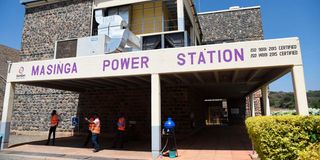Make it easier to sell power to the national grid

Masinga Power Station at Masinga Dam in Machakos County on February 10, 2023.
When President William Ruto made his inaugural speech in Parliament, my heart leapt for joy when, in paragraph 29 of his speech, he said: “We shall facilitate the development of innovative and effective modalities to provide better off-grid systems, including enabling consumers to form small co-operatives for that purpose.”
I grew up seeing solar panels whenever my family visited the village, and it was like the Rolls Royce of rural energy back then, when grid supply was a pipe dream for many. Only a handful of people had them, most of them teachers or civil servants.
A lot has happened since my salad days in the village. Solar systems are now 70 per cent cheaper, according to the United States Solar Energy Industries Association. While it is better to pay for something you will eventually own, community solar systems (community grids) can become the energy disruptor for Africa in the next five years.
Community solar systems benefit everyone who is connected. While this may appear to be a novel approach to energy, the concept is well established.
In peri-urban areas, it is common to see borehole owners supplying water through a meter to their connected neighbours.
Again, for a small fee, one person installs Wi-Fi and then redistributes passwords to his or her neighbours in multiple apartments.
Policy change
How can the President’s plan be implemented? My take is a trinity of schools and institutions, community co-operatives and policy change on net metering.
The business case for schools has always been cost-cutting and reliability. Schools can be centres for energy supply via their vast roof-top real estate, which would afford them revenue for their needs.
The second pillar is community cooperatives. How about converting those thousands of chamas into mini-grid co-operatives that partner with EPCF (engineering, procurement, construction and financing) to install solar mini grids that would profitably sell energy to communities around them at cheaper prices than grid power? This would inevitably be the biggest challenge to the power utility monopoly’s chokehold on power.
Policy review
The third troika would be a policy review by the Energy and Petroleum Regulatory Authority (Epra), which has currently pegged net metering at 0.5 megawatts. This is simply unachievable for small-scale consumers such as schools and co-ops.
A rule of thumb for installers is $1 per watt (Sh125 per watt), so a 0.5-megawatt system as the prescribed minimum would cost between Sh62 million and Sh70 million. Which small co-op or school can have Sh62 million to spare?
Mr President, for your plan to succeed, I implore your graces to consider lowering the minimum threshold to the point where even households can participate in net metering, as they do in Europe and the United States.
Ms Hassan is a Business Development Manager at Solarnow (K) Services Ltd, [email protected]





